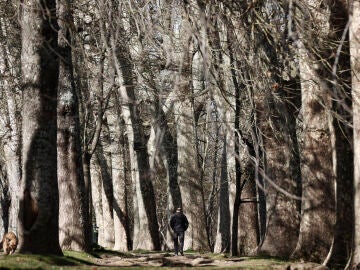
He Council of the EU today adopted a pioneering law to prevent imports into the European Union of certain raw materials and derived products such as palm oil, beef, soy, coffee, rubber, wood or chocolate generate deforestation in third countries. After the endorsement of the plenary session of the European Parliament last month, the approval of the new regulation by the Member States, which are represented by the Council, turns into reality a regulation that aims to address the problem of loss of forest masses both outside and inside the EU.
Every year they are destroyed in the world 10 million hectares of forests, according to UN data, which is equivalent to a territory larger than Portugal, and it is estimated that the EU is responsible for 10% of the reduction in global forest mass, which implies loss of biodiversity and accelerates climate change, according to data of the Council of the EU. The new community law covers livestock, cocoa, coffee, palm oil, soybeans, timber and rubber, including products that contain, have been fed with or have been made with them, such as leather, chocolate or furniture, as well as charcoal, printed paper products, and a number of palm oil derivatives.
Companies will have to provide information on their imports
Companies that import these materials and derived products into the European Union, whether they come from Member States or from third countries, will have to trace its origin and issue a statement of diligence due to guarantee that have not caused deforestation in their places of origin with respect to the existing values as of December 31, 2020. This includes not only deforestation, but also the forest degradation which involves the transformation of primary forests into planted forests.
Companies will have to provide the competent authorities in the EU information about your imports, such as the geolocation coordinates of production, and will be subject to inspections and controls that may range from DNA analysis to satellite surveillance. After 18 months from the entry into force of the regulation, towards the end of 2024, the Commission will make a classification of the countries of origin of the products according to their low, medium or high risk, which will determine the frequency of controls.
For high-risk countries, EU Member States will have the obligation to verify 9% of imports. Sanctions for non-compliance may reach up to 4% of the total billing in the EU of companies that fail to comply with the regulations. Importers will also have to ensure that in the process of obtaining and manufacturing these raw materials and derived products, respect human rights and the rights of indigenous peoples. One year after the entry into force of the regulation, at the latest, the European Commission will assess whether the regulation should also be extended to other forested lands with less tree density (such as El Cerrado in Brazil or El Chaco in Argentina).
Could be extended to other commodities
And before two years Brussels will study whether it should be extended to other ecosystems and raw materials such as corn or pork, goat, sheep and poultry. The regulations could affect the development of the trade agreement between the EU and Mercosur (Argentina, Brazil, Paraguay and Uruguay) signed in 2019 after twenty years of negotiation but blocked without yet being ratified.
France, one of the great agricultural powers of the EU and traditionally opposed to the agreement, fears that the increase in exchanges with those Latin American countries that export agricultural products will generate more deforestation, as several environmental platforms predict. The Zero Deforestation Alliance, in which organizations Ecologistas en Acción, Greenpeace, SEO/BirdLife or WWF participate, applauded the decision, but reminded the community institutions that this is “only the beginning, and that it will be the ambition and rigor in the application of the law that will give the expected results”.
Source: Lasexta
Ricardo is a renowned author and journalist, known for his exceptional writing on top-news stories. He currently works as a writer at the 247 News Agency, where he is known for his ability to deliver breaking news and insightful analysis on the most pressing issues of the day.











